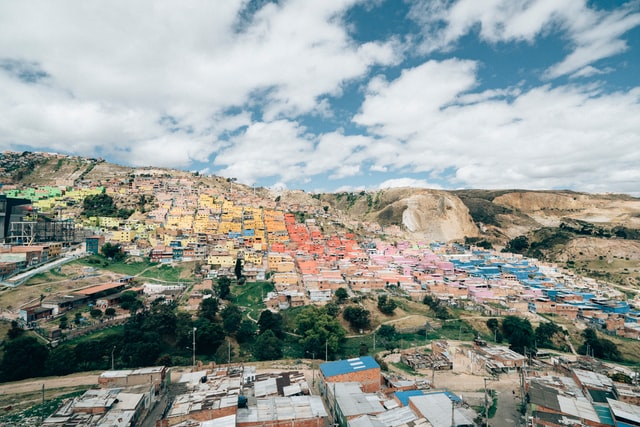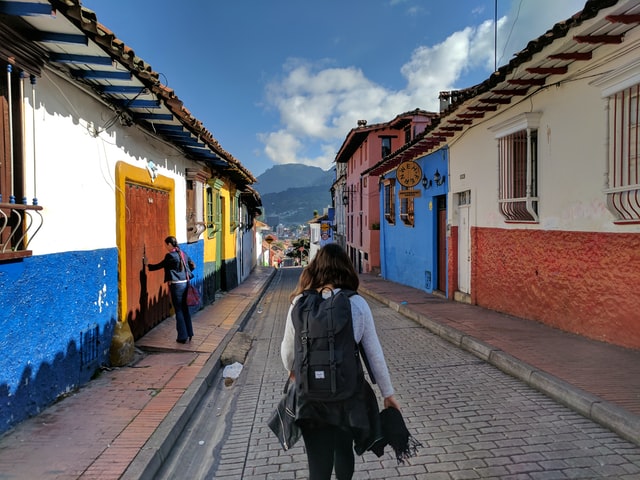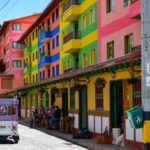Living in Colombia: 6 Things I Wish I Knew Before Moving

I came to Colombia because I wanted to learn Spanish in a place where I wouldn’t be able to resort to speaking English. I wanted to immerse myself in the culture, and not just be sucked into the usual tourist machinery, spat out the other end, my bank account empty and my understanding of culture unchanged.
Colombia has lived up to my expectations, and has taught me things I never expected. Here are six things I learned while living in Colombia:
Living in Bogota: 6 Things I Wish I Knew Before Moving
1. Don’t slam the car door.
I mean it. It turns out that cars in Colombia are generally less robust than their North American counterparts (which I have been blithely slamming for years), and there is a widespread fear among taxi drivers and car owners that even one especially vigorous door closure could structurally damage the car.
I am still not entirely convinced that this is a rational fear–if I can damage the car that easily, what is to become of it in an accident?—but all of the disgruntled muttering is probably sufficient grounds to treat the door gingerly.
2. Do not wear sandals.
From the point of view of Bogota fashion, women wearing sandals are committing a fashion faux pas on the same scale as walking around with a bag on their heads. More importantly, Bogota is one of the highest capital cities in the world, and while it’s true that Caribbean beaches and tropical jungles are just a short plane right away, at 2100 meters it gets cold.
Even if you’re accustomed to colder parts and aren’t especially concerned about conforming to the rigid normative system of footwear in Bogota, wandering around the streets in open-toed shoes and short sleeves is a great way to mark yourself as not just a tourist, but a clueless one–at which point you may as well write in permanent marker on your forehead: “I have lots of money and no idea what’s going on.”
Also, while we’re on the weather, buy an umbrella. Between the months of April and June, and again in September through November, it rains. A lot.
3. Don’t believe all the security advice that people give you about living in Colombia.
During my first week of living abroad, I was given the following advice by a variety of well-meaning and hyper-protective Colombians: never walk alone in the city, never go out after dark, never talk to people, not to answer people when they talk to me, not to bring anything with me when I go out, not to buy anything on the street, not to touch any pieces of paper that people may try to give me, and, if someone tries to talk to me or touch me, to scream loudly and not stop until the police arrive.
As well as being a terrible way to travel, a state of constant low-grade paranoia prevents you from developing a sense of what the real risks are and how to deal with them. There are a lot of things you can do to keep yourself safe in Bogotá, but the two most important ones are to trust your instincts and to talk with local and long-term expat women about what they do to keep safe.
In general, Colombians have a highly specialized sense of which neighborhoods are safe, and where you need to be more careful. If you can get people to move past the urge to be hyper-protective of foreign women (especially those traveling alone), people have very accurate and insightful advice.
4. If Colombian men start rapping freestyle about you in Spanish, play it cool.
If you blush, they’re only going to start rapping about how they have made you blush, and then the entire bus will look at you, and it will become exponentially more awkward.
There is a convention in Bogota of people without stable incomes coming onto the public buses to sell candy or assorted trinkets, to perform songs on the guitar, or, occasionally, to freestyle. Normally, passengers are given the proffered merchandise and expected to listen to a small speech about the merits of the product in question or the circumstances which caused this person to be without stable work.
People are generally good-humored about taking proffered merchandise (although it’s okay to politely refuse), and then either buying it or returning it once the presentation is over. In musical acts, unenthusiastic but obliging audience participation is the norm. If you can be visibly recognized as a non-Colombian, you will most likely receive a bit of extra attention, but as long as you are polite and do not think you are being given free candy on the bus, there’s no problem.
If someone composes an entire song about you (especially likely if you’re blonde), you’re probably going to appear a bad sport if you don’t give them at least a couple hundred pesos (roughly 10 cents in North American currencies).
5. Don’t eat the leaves.
Bogotanos are on the whole so welcoming, friendly, and eager to learn about your culture and show you theirs that it probably won’t be too long before someone invites you to their house for a meal. If it’s a weekend, you’ll probably eat tamales, which, if you’re not acquainted, are delicious corn-meal based dishes with meat and vegetables that come beautifully wrapped in plantain leaves. Which you’re not supposed to eat.
It’s never happened to me while living in Colombia (at least, not that I’ll admit on the internet), but everyone seems to know some expat who was invited to dine with a Colombian family, and, trying to be polite when being presented with Colombian food, gamely proceeds to eat the tamale, plantain leaves and all.
The story is always the same, right down to the expat claiming to think the leaves are delicious and then becoming extremely embarrassed to discover they have been doing the Colombian equivalent of eating their plate.
In my experience, when presented with confusing food or drink, it’s always less awkward to ask what you’re supposed to do than to oblige someone to intervene once you’ve already started doing something weird or inappropriate.
Living in Colombia: 6 Things I Wish I Knew Before Moving.
6. Relax.
In my experience, apart from slamming the car door, there are very few culturally insensitive things you can do that won’t be quickly forgiven once it becomes clear the error was made out of ignorance, not malice. Colombian people—at least, the Colombians I know— are direct, friendly, forgiving, and love to laugh.
They are aware of all the hype and bad press surrounding their country, and relish the opportunity to welcome newcomers and show them the Colombia that is real for them—the richness and breadth of foods, cultures, and traditions, and the warmth and resilience of the people.
Living in Bogota: 6 Things I Wish I Knew
Related Review
Related Reading
Do you have tips for women travelers in Colombia? What were your impressions of the country? Email us at editor@pinkpangea.com for information about sharing your experience and advice with the Pink Pangea community. We can’t wait to hear from you.
Photos for Living in Colombia: 6 Things I Wish I Knew Before Moving by Unsplash.










I’m going to Bogota for 2 months this summer. Is it generally rainy during this time (June/July)? Also, I’m having a really hard time picking a spanish language school to study spanish (my main purpose in being there) any advice?
I live there 6 months a year this is so true
I’m leaving for Columbia in 2 days. Nice to run across this. Even though it’s a bit dated it gave me more insight.